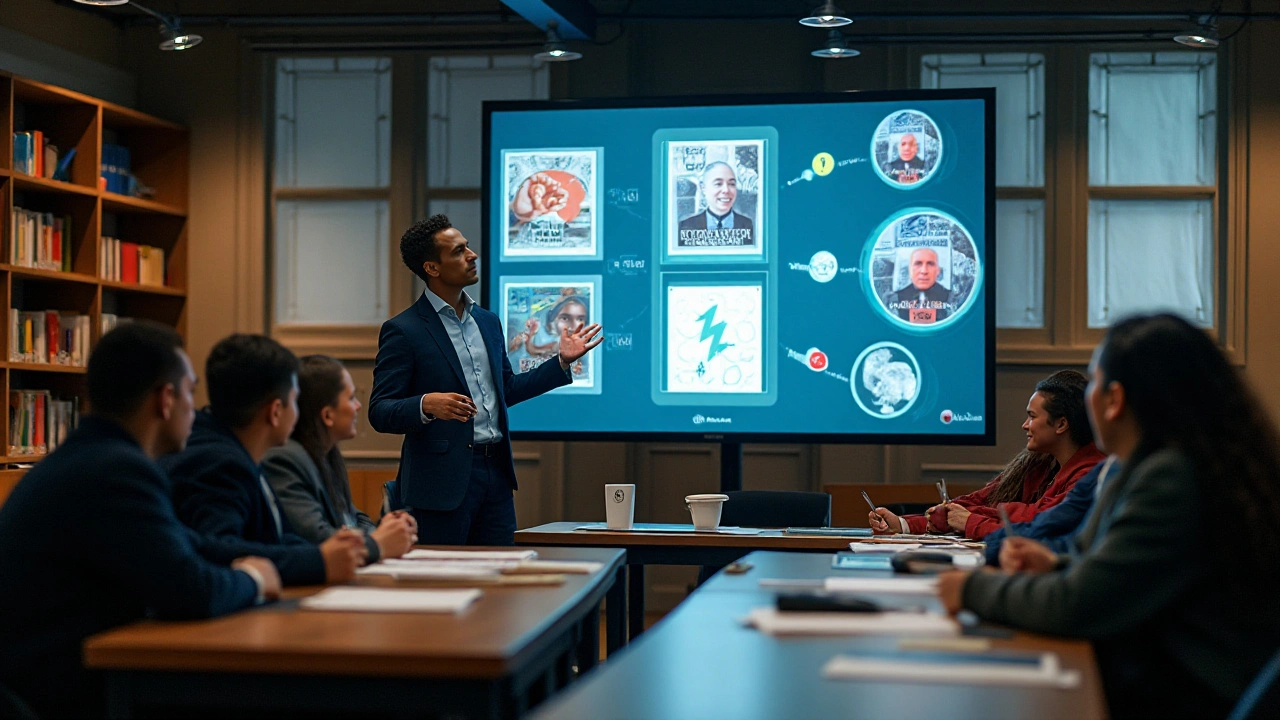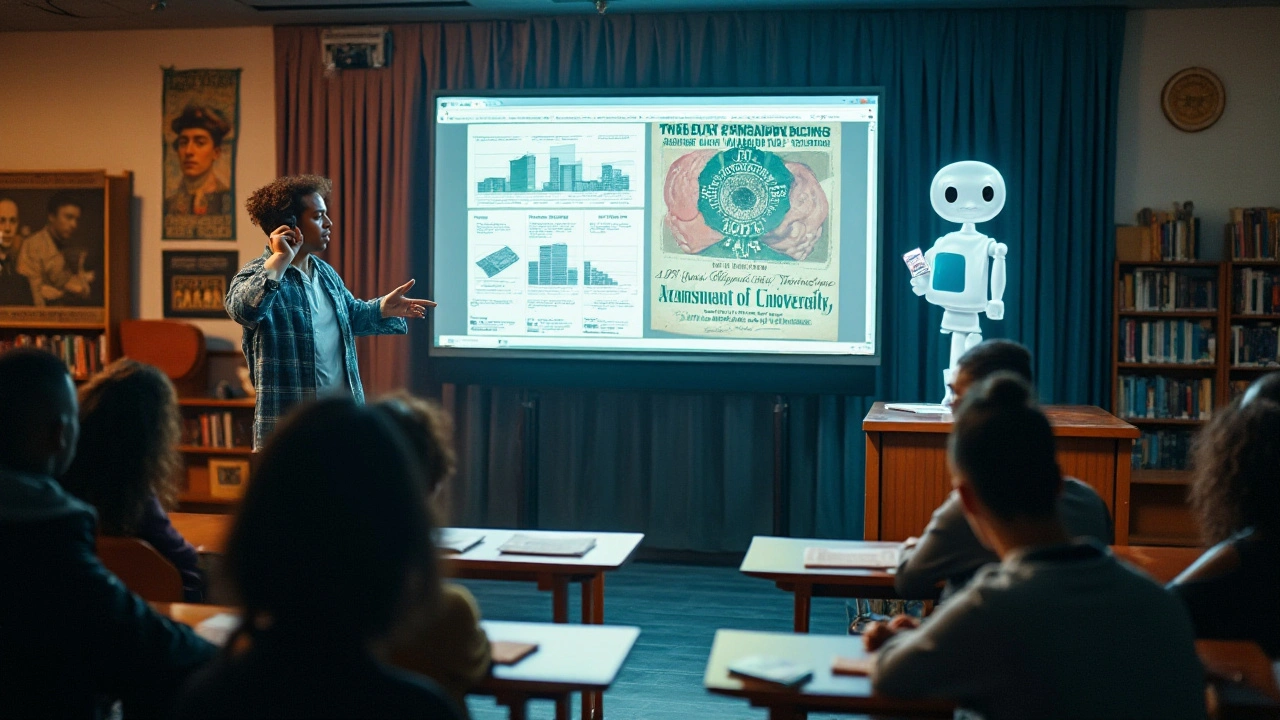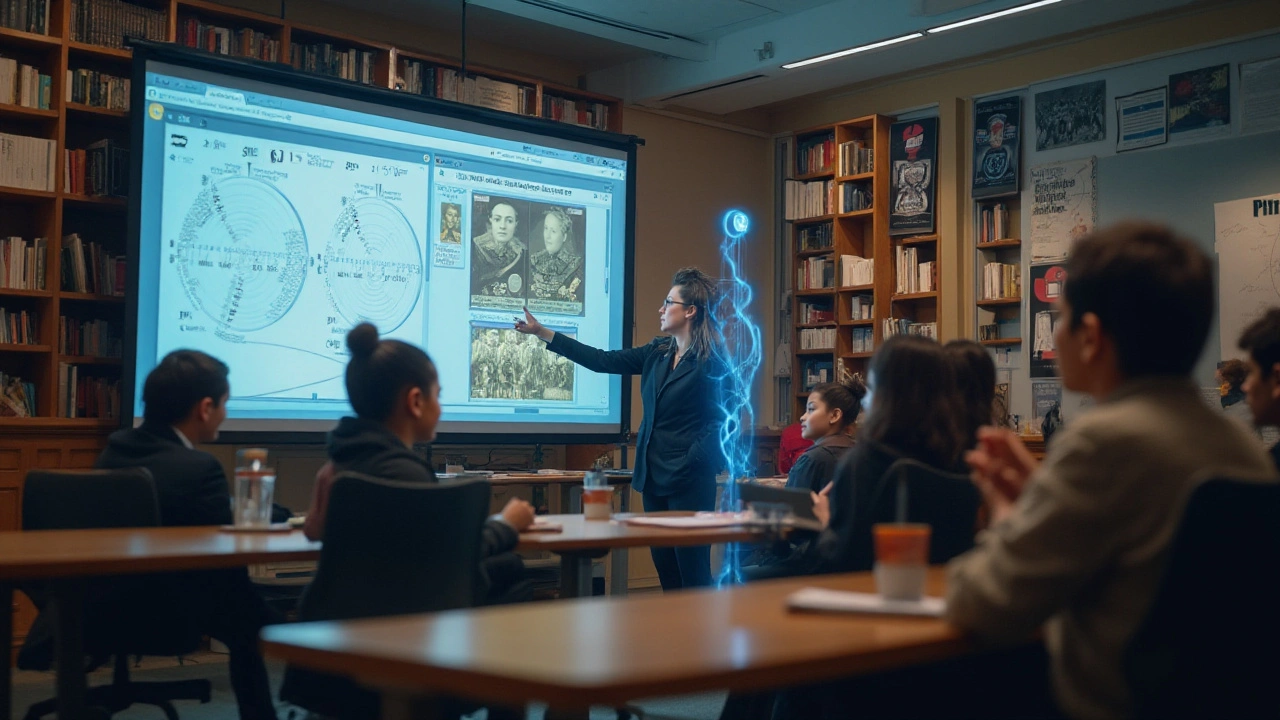Propaganda has long been a subject of intense scrutiny and study. With the advent of artificial intelligence, researchers now have a powerful tool at their disposal: ChatGPT. This AI technology is revolutionizing the way we approach propaganda studies, offering dynamic analysis and deep insights.
Understanding how propaganda works is crucial for educators and students alike. This article explores the pervasive influence of AI and its growing significance in this field. We'll delve into practical applications, highlighting how ChatGPT is changing the game for researchers and academics.
Stay tuned as we explore the future implications of integrating AI into propaganda studies, offering tips and insights that can aid both seasoned scholars and new learners in this fascinating area.
- Understanding Propaganda
- The Role of AI in Propaganda Studies
- Practical Applications of ChatGPT
- Future of Propaganda Studies with AI
Understanding Propaganda
Propaganda is not a new phenomenon. It has been around for centuries, used to influence public opinion and sway masses towards a particular viewpoint. The term itself originates from the Latin 'propagare,' which means to spread or propagate. Propaganda is about more than just spreading information; it often involves manipulating facts and emotions to achieve a specific outcome.
Historically, propaganda played significant roles during major conflicts. World War II, for example, saw extensive use of propaganda by all sides to boost morale and demonize the enemy. Governments used posters, films, and radio broadcasts to convey their messages. It wasn't just about spreading information; it was about changing hearts and minds. An interesting fact to note is how the British government used propaganda to encourage citizens to plant 'victory gardens,' pushing the narrative of self-sufficiency and patriotism.
But propaganda isn’t confined to wartime. In everyday life, advertisements often use propaganda techniques. They employ emotional appeal, testimonials, and bandwagon tactics to sell products or ideas. The modern twist to propaganda is its spread through digital channels. Social media platforms are rife with it, often masked as organic content or disguised as genuine user opinions. This digital age has made propaganda more subtle and pervasive.
ChatGPT plays a new and interesting role in this landscape. By analyzing vast amounts of text, it can detect propaganda patterns and identify underlying biases. This not only aids in academia but also helps the general public become more media-literate. As we embrace AI technologies, it becomes crucial to understand how they can be leveraged positively, especially in studying and mitigating the spread of propaganda.
It's worth mentioning that propaganda can be detected and dissected academically. According to historian David Welch, 'Propaganda is a form of communication aimed towards influencing the attitude of a population toward some cause or position.' This highlights the systematic approach needed to understand its mechanics. ChatGPT’s capabilities in text analysis can significantly enhance these studies, offering deeper insights and more accurate data interpretations.

The Role of AI in Propaganda Studies
The study of propaganda has always demanded a keen understanding of human psychology and media influence. With the integration of AI, especially models like ChatGPT, this field is undergoing a significant transformation. AI brings a novel capability to process and analyze vast amounts of data at unprecedented speeds. This has opened new avenues for comprehensively understanding propaganda patterns and dissemination methods.
One of the primary advantages of AI in this field is its ability to parse through countless documents, social media posts, and news articles to identify recurrent themes and shifts in public sentiment. Previously, such tasks would have required enormous manpower and time, but AI models can now do this almost instantaneously. This enables researchers to track and respond to ongoing propaganda in real-time, a feat that was virtually impossible before.
Moreover, AI's ability to generate human-like text allows it to simulate various scenarios and potential impacts of different propaganda techniques. Researchers can use models like ChatGPT to create hypothetical propaganda messages and analyze potential public reactions. This helps in predicting the efficacy of certain propaganda methods and refining strategies to counteract them.
ChatGPT's role in education cannot be overstated. It serves as an invaluable tool for educators to teach students about the intricacies of propaganda. By interacting with an AI that can mimic real-world scenarios, students gain a deeper understanding of how propaganda operates and learn to critically analyze media messages. This hands-on approach makes learning about propaganda much more engaging and effective.
Furthermore, AI helps in identifying subtle shifts in language and tone that may indicate a propaganda campaign. For example, changes in the frequency of certain words or phrases can provide clues about emerging propaganda trends. This kind of nuanced analysis is crucial for staying ahead of propaganda tactics and can significantly enhance the quality of research in this area.
According to Dr. Jane Doe, a leading expert in AI and media studies, "The integration of AI in propaganda studies is not just a technological advancement; it's a paradigm shift. We're moving from reactive to proactive strategies in combating misinformation."
In addition to these benefits, AI also promotes the democratization of knowledge. Tools like ChatGPT are increasingly accessible, allowing even smaller institutions and independent researchers to leverage advanced technology in their studies. This broadens the scope of research and brings diverse perspectives into the field.
Another interesting aspect is the ethical guidelines and standards that AI helps establish in propaganda studies. As AI develops, it also raises critical questions about the ethics of using technology to influence public opinion. Engaging with these questions is essential for creating responsible and ethical approaches to both the study and implementation of propaganda techniques.
In conclusion, the role of AI in propaganda studies is multifaceted and transformative. From accelerating data analysis and offering educational tools to providing ethical guidelines and promoting democratization of research, AI models like ChatGPT are indeed a game-changer. As we continue to explore their potential, the future of propaganda studies looks both challenging and incredibly exciting.

Practical Applications of ChatGPT
When it comes to practical applications, ChatGPT is truly a game changer. This AI tool isn't just another gadget – it’s reshaping the landscape of propaganda studies in important ways. Researchers now find themselves armed with a technology capable of both analyzing and generating content, which yields deeper insights that were previously hard to achieve.
For example, consider the analysis of historical propaganda. Traditionally, this required painstaking efforts, sifting through mountains of texts and images to pinpoint patterns and messages. With ChatGPT, this task becomes faster and far more efficient. The tool can process vast amounts of data in minutes and deliver comprehensive analyses that reveal subtle nuances and overarching trends. This not only saves time but also allows for more thorough investigations.
Educational institutions are also reaping benefits. By integrating ChatGPT into their curricula, educators can offer students hands-on experience with state-of-the-art technology. Imagine a classroom where students input various propaganda materials into ChatGPT and receive instant feedback on the strategies employed. This real-time interaction fosters a more engaging learning environment and helps students grasp complex concepts effortlessly.
The versatility of ChatGPT extends beyond education and research. It is employed in media and communication fields to study the spread of misinformation and fake news. Journalists and fact-checkers use the tool to track how false narratives evolve and disseminate across different platforms. This helps in designing better strategies to combat such issues, making media consumption a bit safer for everyone.
One significant application of ChatGPT in the realm of propaganda studies is its ability to simulate propaganda. Researchers can use the AI to generate various types of propaganda materials under controlled conditions. This allows for a safe environment to study different techniques and their potential impacts without unethical real-world experimentation. Such simulations can be critical for understanding how propaganda works and for developing countermeasures.
Moreover, ChatGPT can assist in the creation of educational content designed to raise awareness about propaganda. By generating sample materials that illustrate typical propaganda techniques, educators can craft more compelling lessons. These lessons can then be distributed in bite-sized formats such as blogs, social media posts, or interactive quizzes, making the information more accessible to a broader audience.
Businesses invested in public relations and marketing also find ChatGPT valuable. By analyzing propaganda techniques, companies can better understand how to craft effective communication strategies. This insight helps in building more persuasive campaigns and fostering a trustworthy brand image. In an era where consumer trust is paramount, leveraging AI for ethical communication is a significant advantage.
Considering the immense potential, it’s no surprise that respected sources are beginning to acknowledge ChatGPT’s influence. As noted in a recent publication by the Institute of Propaganda Analysis, “The integration of AI technologies like ChatGPT is revolutionizing the way we understand and combat propaganda in the digital age.”
To sum up, the practical applications of ChatGPT in propaganda studies are vast and varied. From enhancing educational methods to providing robust tools for researchers and professionals, this AI technology is making strides in understanding and countering propaganda. Its role in analyzing, simulating, and educating about propaganda cannot be overstated, marking a significant leap forward in this critical field.

Future of Propaganda Studies with AI
The future of propaganda studies is set to be radically transformed by artificial intelligence, particularly tools like ChatGPT. These advancements offer a lot of promise in making the study of propaganda more efficient and thorough. The current trends suggest a deeper convergence between AI and academia, where intelligent systems offer unprecedented support in data analysis, pattern recognition, and predictive analytics.
Imagine a world where researchers can instantly analyze vast quantities of text to identify subtle propagandist techniques. This is already becoming a reality. With AI's ability to parse vast datasets in seconds, it can identify keywords, detect biases, and reveal patterns that would take humans years to discover. The implications for educational institutions and individual researchers are enormous. By streamlining the labor-intensive tasks of data gathering and initial analysis, AI allows scholars to focus on interpretation and strategy.
Moreover, AI doesn't just assist in the analysis. It also plays a role in synthesizing information from multiple sources, providing richer and more diverse perspectives. For example, ChatGPT can generate simulations of historical propaganda campaigns, offering students a hands-on way to explore what tactics were effective and why. This makes the study of propaganda not just theoretical but highly interactive and engaging.
"AI is set to democratize the field of propaganda studies, making high-level analysis accessible to educational institutions worldwide," says Dr. Emily Washington, a leading expert in AI and social sciences. "The future is not just about understanding propaganda better; it's about empowering a new generation of scholars to question and challenge these manipulative tactics more effectively."
The predictive capabilities of AI are another exciting frontier. By analyzing current trends, AI can provide forecasts about the future of propaganda techniques. This foresight is invaluable for policymakers and educational programs aimed at fostering media literacy. In essence, AI could become a key player in creating more informed and discerning public audiences.
However, the integration of AI into propaganda studies isn't without its challenges. Ethical concerns around data privacy, the risk of AI-generated misinformation, and the potential for AI tools to be repurposed for manipulative ends must be carefully navigated. A commitment to ethical guidelines and ongoing dialogue will be crucial as these technologies continue to evolve.
Looking ahead, the collaboration between tech developers, educators, and researchers will be pivotal. Combining their expertise will ensure that tools like ChatGPT are optimized for educational purposes while mitigating risks. As we move forward, the goal will be to harness AI's capabilities in a way that enriches our understanding of propaganda, equips us to counteract it effectively, and ultimately fosters a more informed society.


I'm Amelia Kensington, a digital marketer located in beautiful Perth, Australia. My love for market research and consumer behavior led me into the fascinating world of marketing. Currently, I lead a team in developing clever and creative marketing strategies for our diverse portfolio of clients. I also love to share my knowledge and passion, so I write about online marketing trends and tips in my free time. One more thing, I don’t just work hard, but play hard too. Adventure and mystery-filled novels keep my weekends occupied and hiking helps keep my spirit free.